Care, and Counseling.

Introduction p. 3 Interviews p. 4-19 • • • • • • • Dr. Ann Graber (full transcript) Dr. Stephan Peeck Dr. Edward Marshall Dr. Anne Niiles-Mäki Rabbi Dr. Mordecai Finley Dr. David Sar Shalom, MD Luis Marrero Translations • • • Dr. Heye Heyen Dr. Stephan Peeck Dr. Ulrich Kusche Bonus Content • • • 2021 Logosermon 2021 Book Press Release Book interview pp. 4-13 p. 14 p. 15 p. 16 p. 17 p. 18 p. 19 pp. 20-22 p. 20 p. 21 p. 22 pp. 23-29 p. 23 p. 29 p. 30 Sign My Yearbook pp. 31-32 Dedication A special word of thanks is in order to my webmaster and friend, Nate Martin of NX2 Agency. Thanks to Nate for all the hard work on my website, Youtube channel, interviews, and other formatting issues! nate@nx2agency.com p. 33-34 • • Teachers Family In the Pipeline for 2025 p. 33 p. 34 p. 35 © Copyright 2024 meaninginministry.com. A lot of this material is shareware, graciously contributed by colleagues in the field. Please give due credit to each contributor and this publication if you make use of their material. © Copyright 2024 meaninginministry.com. Ein Großteil dieses Materials ist Shareware, die freundlicherweise von Kollegen aus der Praxis zur Verfügung gestellt wurde. Bitte geben Sie jedem Mitwirkenden und dieser VeröOentlichung die gebührende Anerkennung, wenn Sie ihr Material verwenden. Copyright 2024 meaninginministry.com. Gran parte de este material es shareware, amablemente contribuido por colegas en el campo. Por favor, si utilizas su material, da el debido crédito a cada colaborador y a esta publicación. © Copyright 2024 meaninginministry.com. A lot of this material is shareware, graciously contributed by colleagues in the field. Please give due credit to each contributor and this publication if you make use of their material. 2
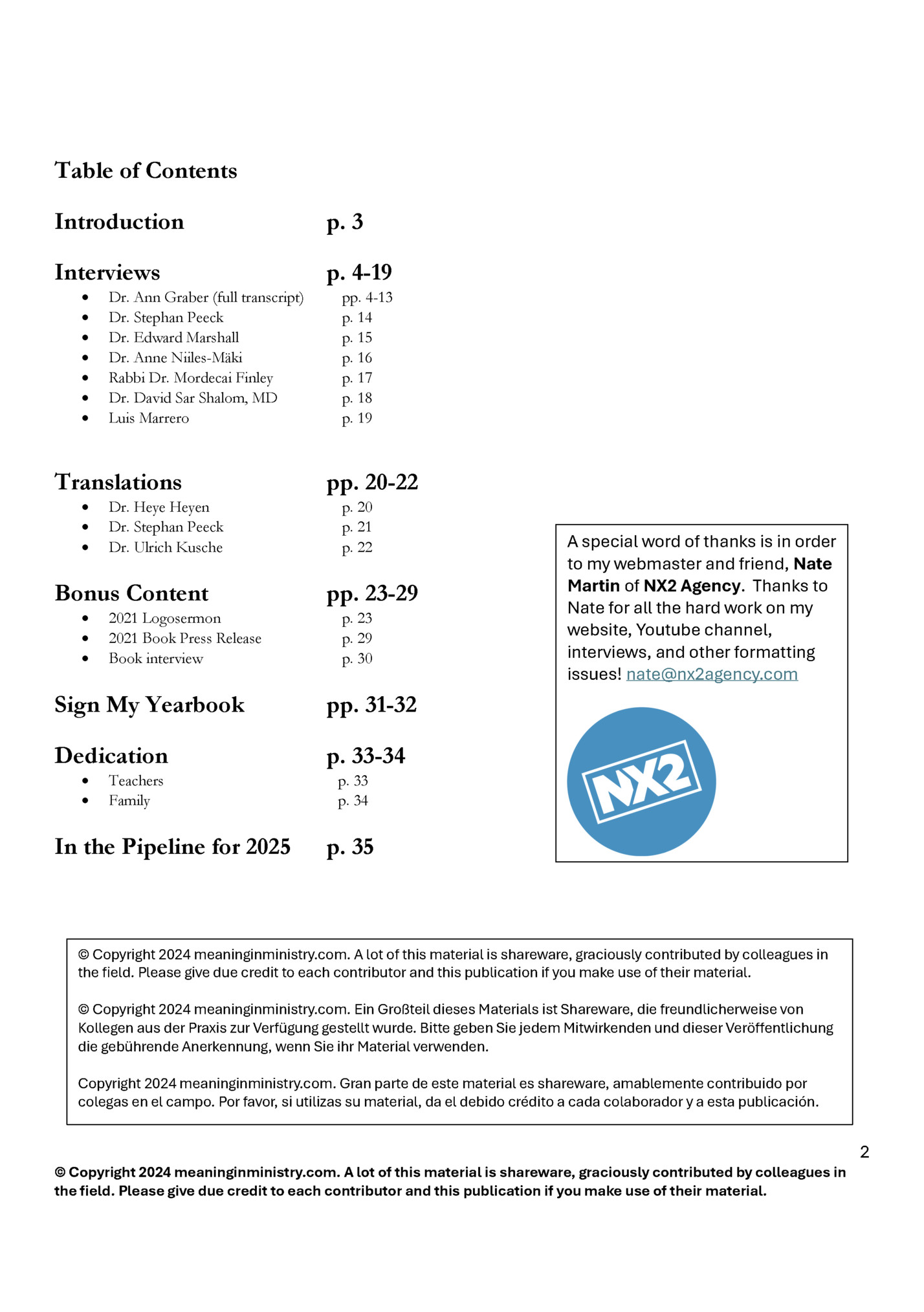
Welcome to the first yearbook of Meaning in Ministry.com! 2024 has been a busy year for me. I began working on my Diplomate project in Logo-Philosophy with Dr. Ann-Marie Neale (Viktor Frankl Institute of Logotherapy). I began learning German to be able to read books by Frankl (and others) not yet translated into English. I began learning Wertorientierte Imagination (Value-oriented imagination) with Dr. Stephan Peeck (Institutes für Logotherapie und Existenzanalyse Hamburg – Bergedorf), and I conducted many interviews for my website. Now I am delighted to share some summaries and bonus material in this yearbook! It is a real privilege to have so many willing mentors and conversation partners. What a blessing to be able to reach out to willing people all over the world to talk and share information! Without their generosity and openness, this year of growth would not have been possible. What would the world be without Logotherapists? “You are the salt of the earth!” Here is the 2023-2024 “Thank you list.” Some, but not all, have content on my website, but each deserves a word of appreciation: Rabbi Dr. Mordecai Finley Dr. Ann Graber Rev. Dr. Heye Heyen Dr. Wolfram Kurz Dr. Ulrich Kusche Dr. Willem Maas Dr. Anne Niiles-Mäki Mr. Luis A. Marrero Dr. Edward Marshall, M.D. Dr. Maria Marshall Dr. Ann-Marie Neale (my Diplomate supervisor) Dr. Charles McLacerty Ms. Sladjana Milosevic Sr. Jaime Paniccia Dr. Alex Pattakos and Dr. Elaine Dundon Dr. Stephan Peeck (my Wertorientierte Imagination instructor) Dr. Karl-Heinz Röhlin Dr. David Sar Shalom, M.D. Dr. Andreas Schreiber Note: I have listed everyone I can remember to thank for their willingness to engage me in conversation, teach me, etc. Some have also contributed content (interviews, articles) to my website. This is not to imply that any of these fine people wholly agree with or endorse everything included in my work. My shortcomings are my own. If I have left anyone o- the list, I am truly sorry. It was not my intention to do so. © Copyright 2024 meaninginministry.com. A lot of this material is shareware, graciously contributed by colleagues in the field. Please give due credit to each contributor and this publication if you make use of their material. 3
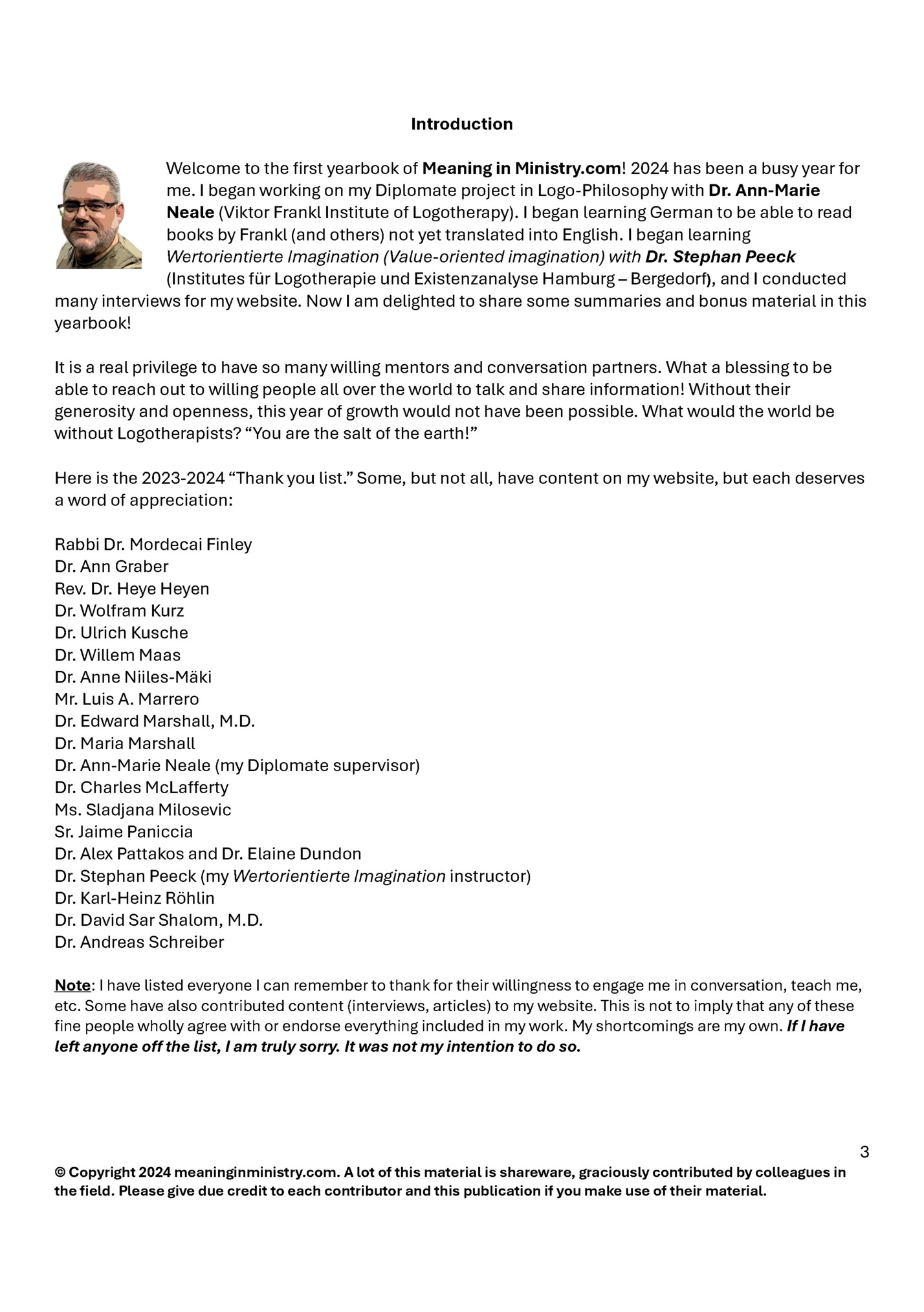
Interviews Bio: Dr. Ann V. Graber is Professor of Pastoral Logotherapy, Fellow, founding Director of the Graduate Center for Pastoral Logotherapy and recipient of the Doctor of Divinity (honoris causa) at GTF. Ann grew up in Europe, was educated in Austria, and later continued her higher education in the USA. She studied Dr. Viktor Frankl’s Logotherapy, the Third Viennese School of Psychotherapy, culminating in the Diplomate Credential from the Viktor Frankl Institute of Logotherapy (1993). She joined the Institute as a professional member and mentored many students. Her particularly innovative contribution to the Institute has been the “Distance Learning” outreach and participation in developing an English language curriculum in Dr. Viktor Frankl’s Logotherapy. Ann’s quest for greater spiritual understanding led her to study Pastoral Psychology and Counseling at the Graduate Theological Foundation, earning the Doctor of Ministry (1999) and subsequently the Doctor of Philosophy in Pastoral Psychology (2002) degree. After completing her Ph.D. studies, Dr. Graber was invited to join the GTF faculty and became the liaison between GTF and the Viktor Frankl Institute of Logotherapy. When GTF established the Graduate Center for Pastoral Logotherapy in 2012, Dr. Graber was honored to serve as its initial Director (2012-2017), developing a core curriculum in Pastoral Logotherapy with fellow faculty members who were adept in Pastoral Care and Counseling and duly credentialed in Logotherapy. The Pastoral Logotherapy initiative of the GTF is the first of its kind to focus specifically upon the pastoral application of Dr. Viktor Frankl’s meaning-oriented Logotherapy, which is inclusive of the noetic (spiritual) dimension in its counseling approach. Interview: Late 2023. https://www.meaninginministry.com/interviews-1 (bottom of page). Books: Viktor Frankl's Logotherapy: Meaning-Centered Counseling (2004), The Journey Home: Preparing for Life's Ultimate Adventure (2009), and Journey to Your Interior Castle (2010). Quick summary: In this meeting, Dr. Graber discusses her journey of studying Logotherapy and earning her credentials at the Viktor Frankl Institute and the Graduate Theological Foundation. She shares examples of how Logotherapy has been applied in pastoral care, including a Muslim imam helping, a rabbi, and a Catholic priest. The discussion also touches on the mystical aspects of Frankl's work and the opportunities for pastors to explore Logotherapy through the Graduate Theological Foundation. Note: Below is the transcript of my audio interview with Dr. Graber. Unfortunately, the sound quality is not the best and I also botched the first minute or two of sound. For these two reasons, I present here a word for word transcription of our conversation. It has not been cleaned up for grammar so that the wording here matches the audio. © Copyright 2024 meaninginministry.com. A lot of this material is shareware, graciously contributed by colleagues in the field. Please give due credit to each contributor and this publication if you make use of their material. 4
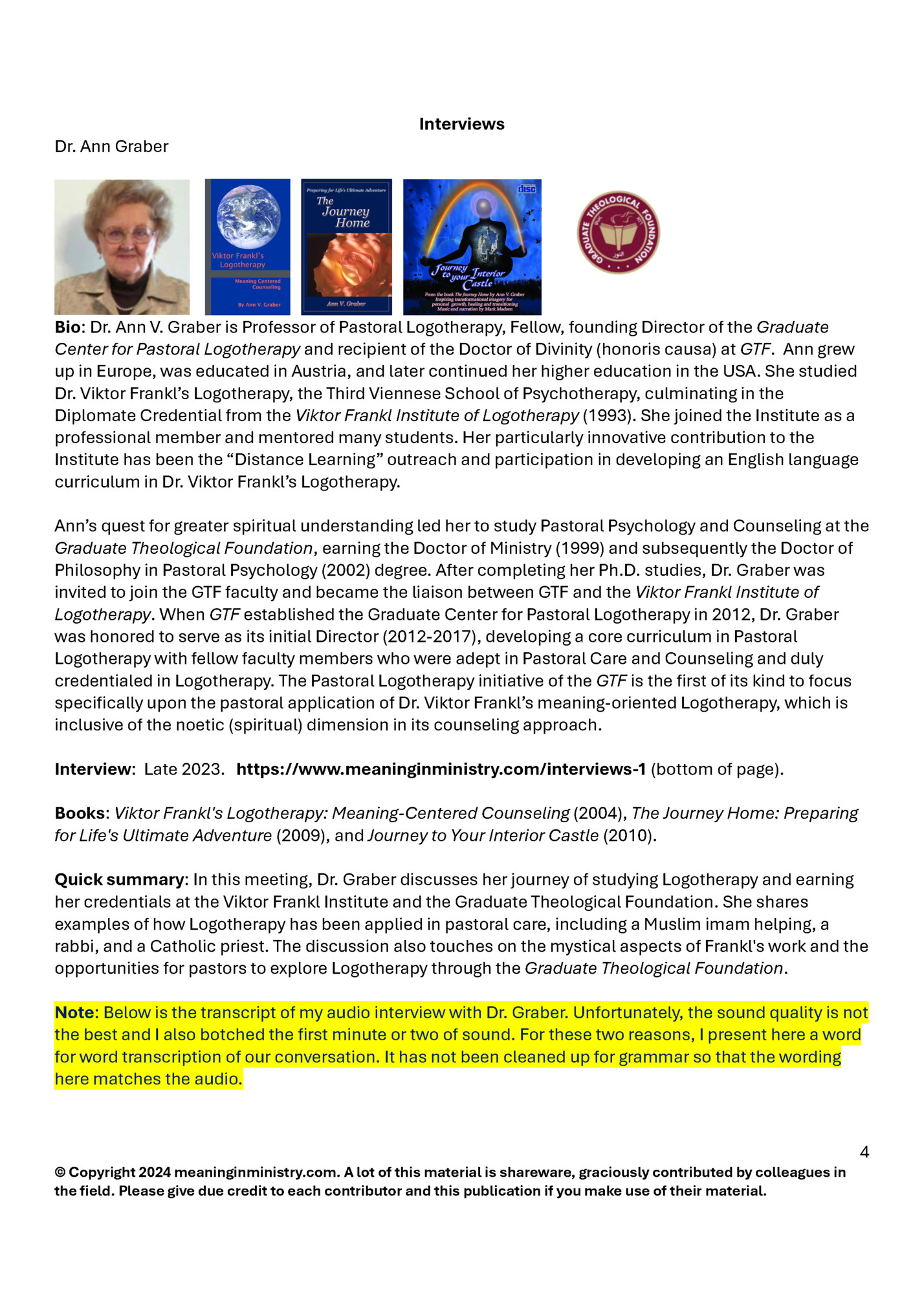
could find meaning in life after what he lived through, I can look for meaning in my life under my circumstances. And as I had this more positive outlook, again, things came my way that are just beyond description, such as synchronistic events. I'm still recovering, this is 3-4 years after my initial quadriplegia, and I was getting some better. But I so wondered, how can I study Logotherapy? And then I find this flyer in my mailbox—I mean, at the time I'm a housewife. This flyer in my mailbox announcing that the Mid-America Institute, which was then located in Kansas City, is bringing Dr. Elizabeth Lukas to the United States to teach a seminar, a weeklong seminar on Logotherapy. Tom: Wow. Dr. Graber: It was just, well, I can't get to Vienna, but I can get across the state. I live outside of St. Louis, and I can get across the state and make it to Kansas City. I did. It was very, very dicicult getting around there for a week, but it's really—this is what I want to do in my life. And especially her emphasis also was she had written numerous books and in some she's often praised as the primary student of Viktor Frankl. Tom: Right. Dr. Graber: So, I came to know her, and we could talk in German and I could read her books. And so, this was my major drawing card. And then I continued studying Logotherapy. And eventually in 1993, I earned my diplomate credential at the Viktor Frankl Institute. And then I was thinking, well, now I'm a diplomate, if I'm going to be teaching psychologists or counsellors, I better get a higher degree. In looking around—I really looked at Missouri University and I looked at colleges around here and what I found was, well, too limiting for me. I had a broader cultural background. English was one of the later languages I had to learn. And these colleges here at the time, people were too local. Some of them hadn't been out of the state yet, right? And I just didn't fit in. So, to my astonishment, I was seeing a therapist at the time, and I asked her, you know, where did you get your training? You're so good. And she said, oh, at the Graduate Theological Foundation I earned, you know, after seminary, I earned my doctorate at the Graduate Theological Foundation. So, I applied and what so impressed me is that The Graduate Theological Foundation was founded in 1962, and very much they wanted to be diverse, inclusive, welcoming of all faith traditions as well as people with broad cultural backgrounds. And today we have globalized so much since then. But anyway, I went there, and I loved the people I found there, every shade and hue of color and background and every accent. And so that was my drawing card to GTF. And then because as I first earned, my D.Min. and my book, The Journey Home was actually the thesis of that degree, but then I wanted to earn a PhD, and Frankl's Logotherapy: Method of Choice in Ecumenical Pastoral Counselling, was my dissertation for the PhD. Tom: Right. Dr. Graber: Then when I defended my dissertation, one of the highlights of my life. I had a committee consisting of the President of the Theological Foundation, a Dean from Oxford, and a well-known, well regarded Catholic university professor. This was my committee that grilled me on my during my © Copyright 2024 meaninginministry.com. A lot of this material is shareware, graciously contributed by colleagues in the field. Please give due credit to each contributor and this publication if you make use of their material. 5
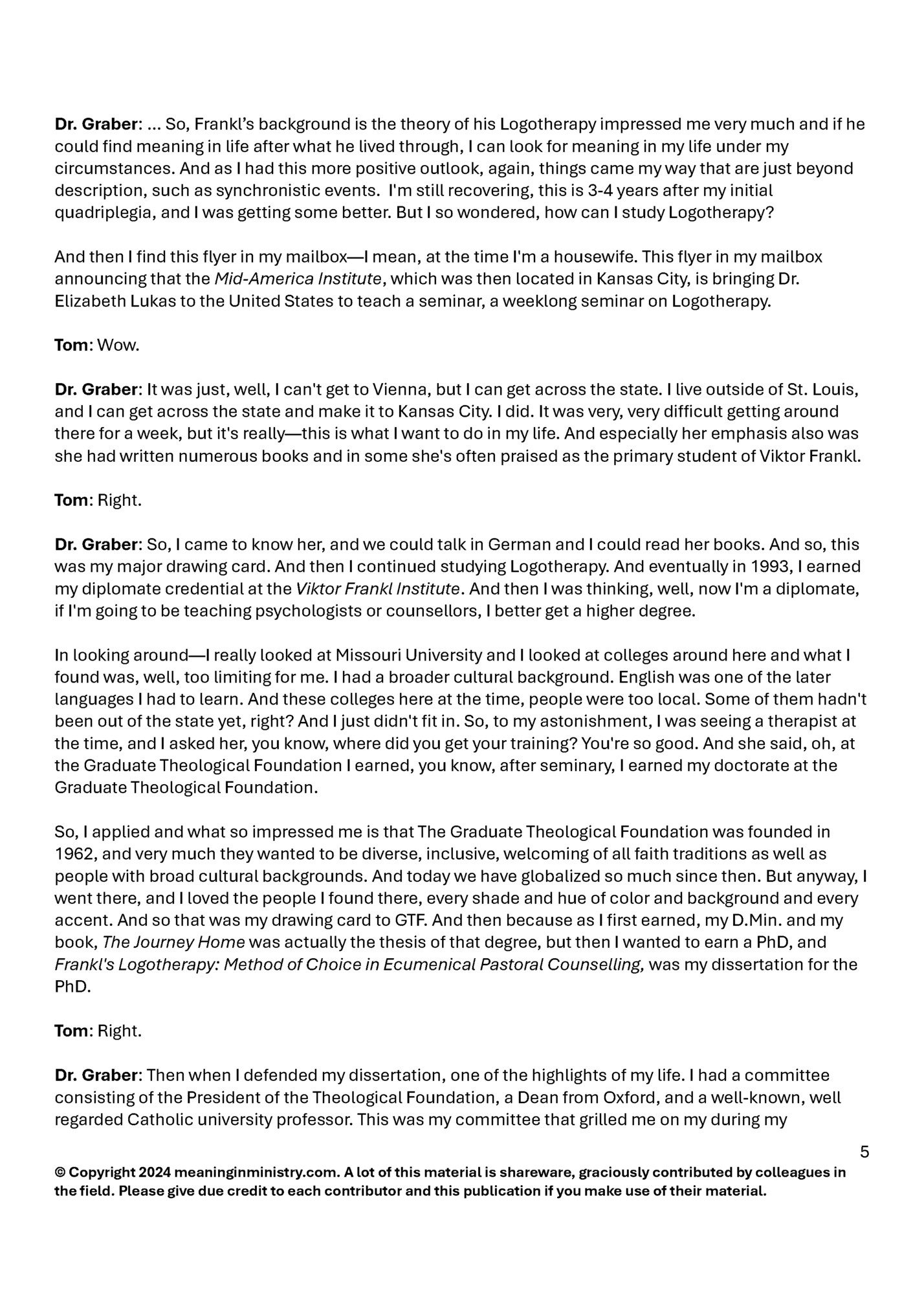
step out? We will discuss your answers. And I come there after a while, I'm invited back in, and the question now is, oh, congratulations, Dr. Graber, you passed. And then the president, Dr. Morgan at the time, invited me to join the faculty. Tom: Nice. Dr. Graber: One of the biggest moments in my life. Anyway. I happily accepted his invitation and now it became obvious this is an institution that is very ecumenically oriented. Yes, and they're looking for their training pastoral counsellors. So, we wanted explicitly to apply it or, for those who were interested in the pastoral local therapeutic application, it's available. And by this time, I first started as a faculty member of the Viktor Frankl Institute after I earned my diplomate in 1993, and then as a college professor at GTF . I know I have had students from 50 countries. Tom: Wow. Dr. Graber: And it's just amazing what has happened since then, the outreach, the global outreach we now have. Tom: Yes. Dr. Graber: And, you know, diversity. We need to be inclusive and we need to be welcoming of all and by and large, yes. So this is how the pastoral Logotherapy team at least, but that was my contribution. Tom: Well, yes. And of course I went looking once I had really discovered Frankl. I guess I don't say philosophy, but I discovered Logotherapy, Existential Analysis in my own life, began to implement it in the ministry. And then I thought, well, there has to be a training program for higher credit. And then I found the GTF and I found you and the rest is history. Wonderful. Yes, thank you it. Dr. Graber: Was so amazing to me when I OK connection with Frankl. Yes, I had met Dr. Frankl on several occasions, but it was always, you know, I'm one in a line of people shaking hands. But then I attended his birthday party, his 90th birthday. Tom: Wow. Dr. Graber: In Vienna by invitation and there were about 1200 people there and that's when I met the grandchildren. His grandchildren, the young lady is the older and then the younger one is the grandson. And so, he noticed that I not only speak German, Austrian, German, so English. And then in time, he was still studying with Dr. Lukas. And when he had completed his studies with Dr. Lukas, he heard about our diplomat credential in the United States and wanted to know what he had to do to earn it. So, I told him, well, it requires a project, and most people write a book. I don't like to write. What do you like to do? I make films. Tom: Right. © Copyright 2024 meaninginministry.com. A lot of this material is shareware, graciously contributed by colleagues in the field. Please give due credit to each contributor and this publication if you make use of their material. 6
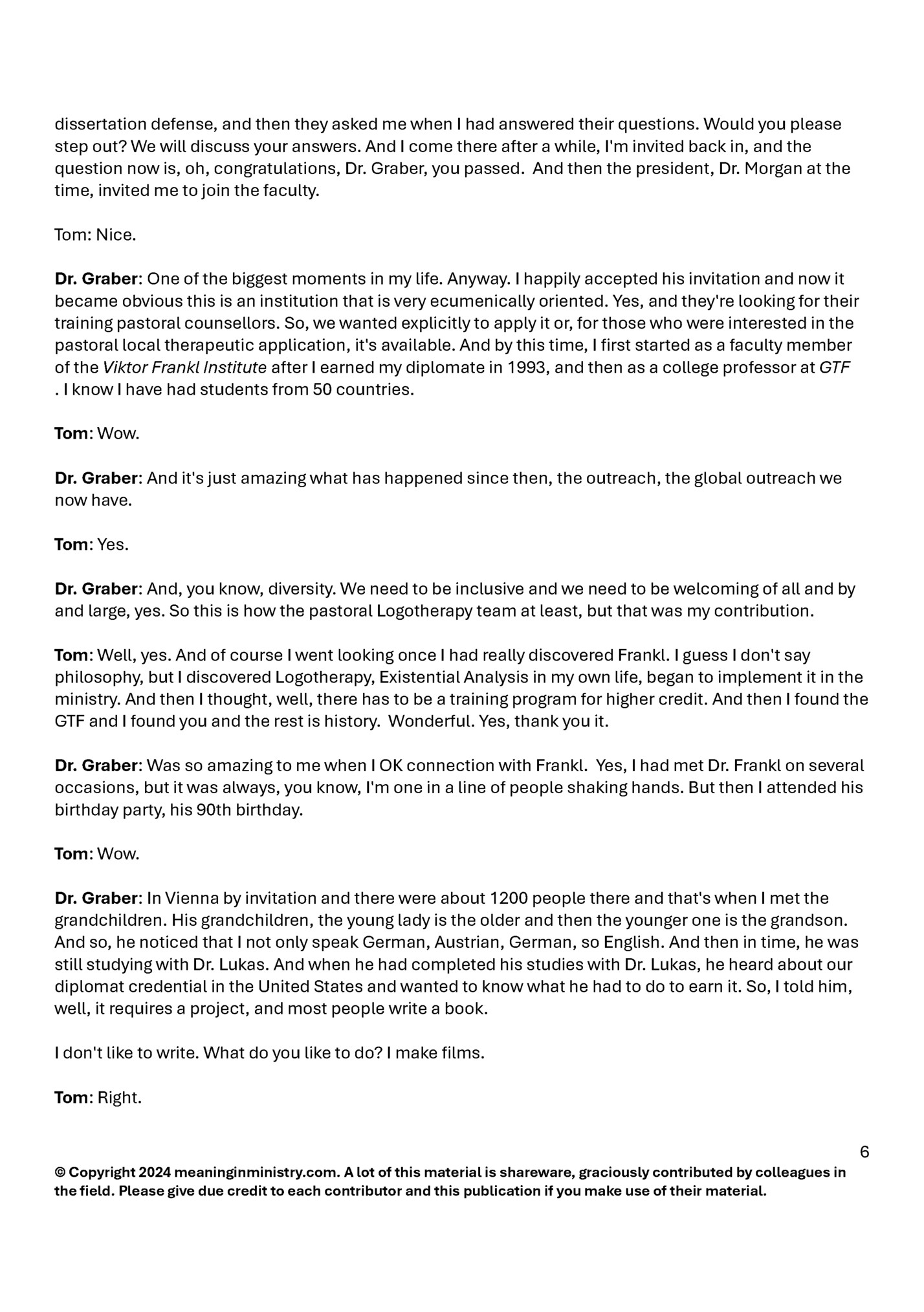
committee, right? And he made a film for Joe and I and it's a great film. It was this strong emphasis on the noetic dimension, right? More than just mind and feelings and body. We have a higher level of awareness but needing to bring to tap into it and that is where we will be guided in our life purpose our do it meaningfully and so forth, right. So that helps to establishing. Tom: Very nice. Dr. Graber: Viktor Frankl. Yes. Tom: I, you know, you made me think about the fact that we're talking about implementing Logotherapy and Existential Analysis in, in forms of pastoral care. And I, I know from having read not just books that Frankl wrote, but also in the introductions that he wrote for, I think for definitely for Donald Tweedie's book and possibly for Robert Leslie's. I can't remember if he did that, but he always, and also for Ruben, he was. Dr. Graber: He was. He was half a century ahead of me. Tom: OK, Ruben, Ruben Bulka, who died recently, a rabbi who worked and wrote. So what I'm getting at is even though, you know, generally Frankl wrote and kept theology a little bit separated, he always seemed to welcome people adapting and implementing Logotherapy in related fields or other fields. And so how do you think he would have looked at the concept of pastoral Logotherapy as a specialized field? Dr. Graber: I think it's a natural. Tom: Yes, it's. Dr. Graber: I don't see it as a specific, I see it as an application of Logotherapy in a specific field. Tom: Yes. Dr. Graber: Not so much as a specific introduction of Logotherapy. And another thing what you were mentioning that it is trans-denominational or trans-religious. Yes, I have certainly had people from many, many religions. And because we're not exclusively Christian or Jewish, or what have you, but we speak of the human spirit. Tom: Yes. Dr. Graber: And so that makes it available. And you know, another thing that happened, I used to work as a transcriptionist in a hospital. And so, I was acquainted with the medical records. What we didn't have at the time, and we're back before my accident about 40 years ago, yes, patients could request that their minister, their priest, their rabbi come and see them, but we didn't have pastoral care. Tom: Right. © Copyright 2024 meaninginministry.com. A lot of this material is shareware, graciously contributed by colleagues in the field. Please give due credit to each contributor and this publication if you make use of their material. 7
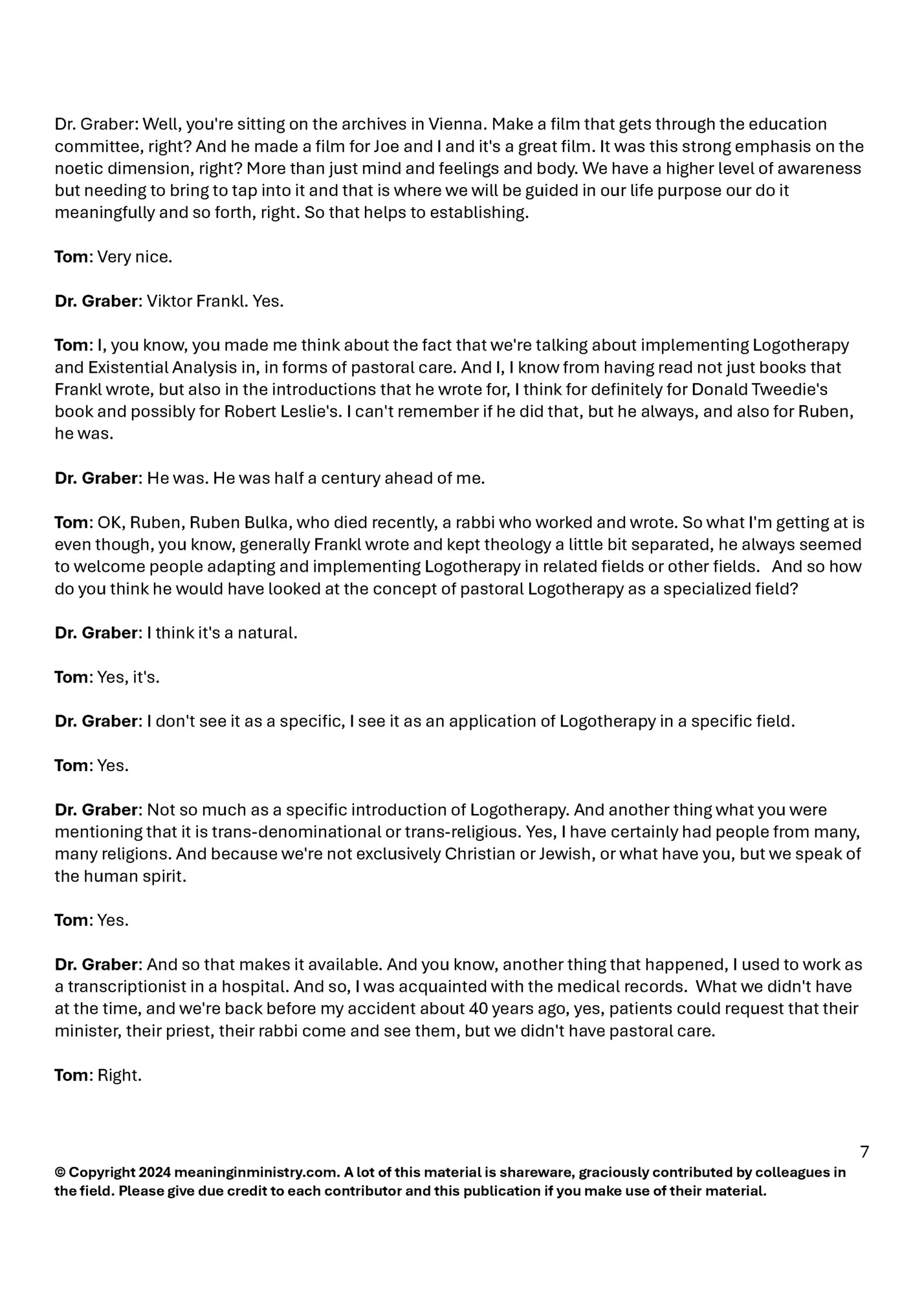
method not only to bring their own religious traditions to the bedside, but maybe to have a better understanding of the psychological approach to this person. So, in that sense, pastoral Logotherapy gained in popularity. Also, many, many of the students, especially in recent times, have been chaplains in pastoral care in various settings. Tom: Right. Well, I, I agree with everything you said. And it's an interesting dynamic for me to think about how, Yeah, you know, you're talking about implementing Logotherapy in a specific field such as pastoral care. So yeah, now, now I'm thinking about do I call myself a pastor and a Logotherapist? Do I call myself a pastor who implements Logotherapy in my work or so how does the word pastoral and Logotherapy modify each other, or do they stand separately? That's a tough one for me. Dr. Graber: When an imam wouldn't call himself a pastoral logotherapist. Tom: Yeah, I wouldn't call. Dr. Graber: Himself I'm Nima, and I do meaning-centered … Tom: Aha, that's OK. Yeah, right, right. Dr. Graber: And so I hope whatever feels authentic to the person using the term. Tom: Right. OK. So do you, do you associate the word pastor then with Christianity? Pretty much. Dr. Graber: Well, pastoring is more, I see it more as the wise elder. Tom: Sure. Dr. Graber: And so, when it becomes a title in a given denomination, that's specific denomination, but pastoral would be kind of— Tom: As an adjective, it is. Dr. Graber: As an adjective, yes, and then it becomes more widely applicable. Tom: Yes. Dr. Graber: And I really like the term, you know, wise elder. Tom: Yes, you know, that's something that I teach. We have, you know, in my denomination, we have elders who serve in the church. And it's important for me to let them know that, you know, you are, or let me rephrase that. I am a paid elder. You know, my, my job, my title may be senior pastor, but that's the word senior there tells me that I'm, you know, at the top of the pyramid, so to speak. And I hate to say it that way, but then there are all these others who are elders who, you know, they make it possible for me to be with a larger number of people by, you know, making contact with a, with a certain number of our people. And the word pastor comes obviously from shepherding, right? You know, shepherding sheep in a © Copyright 2024 meaninginministry.com. A lot of this material is shareware, graciously contributed by colleagues in the field. Please give due credit to each contributor and this publication if you make use of their material. 8
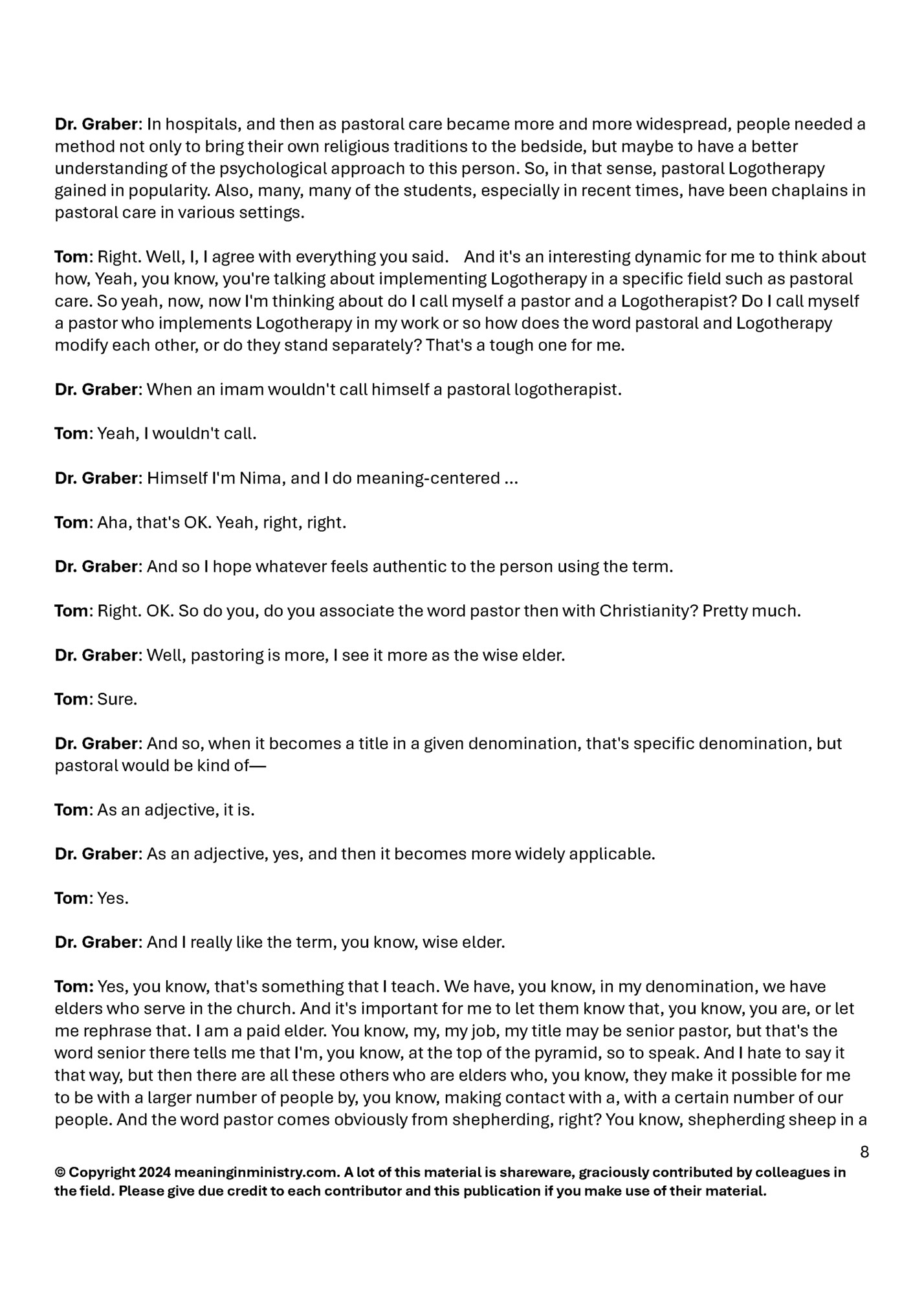
rabbis and imams and Catholic priests and Orthodox priests and Protestant ministers and maybe some shamen or, you know, people of other religious traditions. And we talk about what we have in common in terms of our practice. You know, we don't have a label that we can put on that that's applicable to everybody. Like the word pastoral Logotherapy would not be appropriate across the board in that situation. Dr. Graber: OK, then you can go with meaning-centered existential psychology. Tom: Right. OK, very good. So, you talked about last week in our conversation, 3 examples that I think would be worth sharing if you're willing to do that. You said a, you talked about a, an African American Muslim Imam, a conservative rabbi, and a Catholic priest. And the question that I had written was along the lines of you have worked with students from all parts, parts of the world and many religious backgrounds. And so, would you share a few examples with us? Dr. Graber: Yes, I will be glad to and these three came to mind because we were looking at not only interfaith, but oh, interracial, shall we say. And so, the three former students who come to my desk, many still staying, but when the need arises. And I had many, many calls during this pandemic, especially. So, the first one I received a call one time from a former student who is an African American Muslim imam. And he said calls to say we are evacuating a nursing home that is flooding. What does Logotherapy have to ocer? And I said, well, we don't have a specific technique how to evacuate a nursing home that's flooding, but if you go to the underlying principles as Frankl used. So, in this case, it would be helping these people feel less terrified, frightened. You can see the water rising and am I going to drown and so forth. Anyway, we had this brief conversation. He needed to run along. And then later on he told me, oh, you know what I did. Yeah, I'm so impressed, he said, First, I went back to my pastoral care giving colleagues and told them, look, let's take oc our regalia our […] that identify us as I don't want to walk into some Christian's room and look like an imam. She thinks now what is he trying to convert me? No, If I go in in my street clothes and say how can I help you? What can I do? Tom: Right. Dr. Graber: [continuing] … Can I get you out of bed? Can I roll you and you're out of here in your wheelchair? You know, we're being flooded. We need to act fast. This approach, Frankl always emphasized first you establish a trust bridge. Yes. Without it, therapeutic tracic cannot travel. And by extending yourself to the other, what can I do to help? You are reaching out to them. And then if they respond, oh yeah, please get my whatever. And it's a work in progress already. And then he said as he had them in their wheelchair, anything that's precious to you that you want to take with you, that you can have in your lap. And it's maybe the only thing that will survive. And some will reach for their prayer beads. Others will reach for a family photograph or something like that. And then out in the hall, they go. And he said, yes, we didn't lose anybody. We got them all to another destination. But he said it is so crowded, we have people everywhere and hope they make it. And that was one. © Copyright 2024 meaninginministry.com. A lot of this material is shareware, graciously contributed by colleagues in the field. Please give due credit to each contributor and this publication if you make use of their material. 9
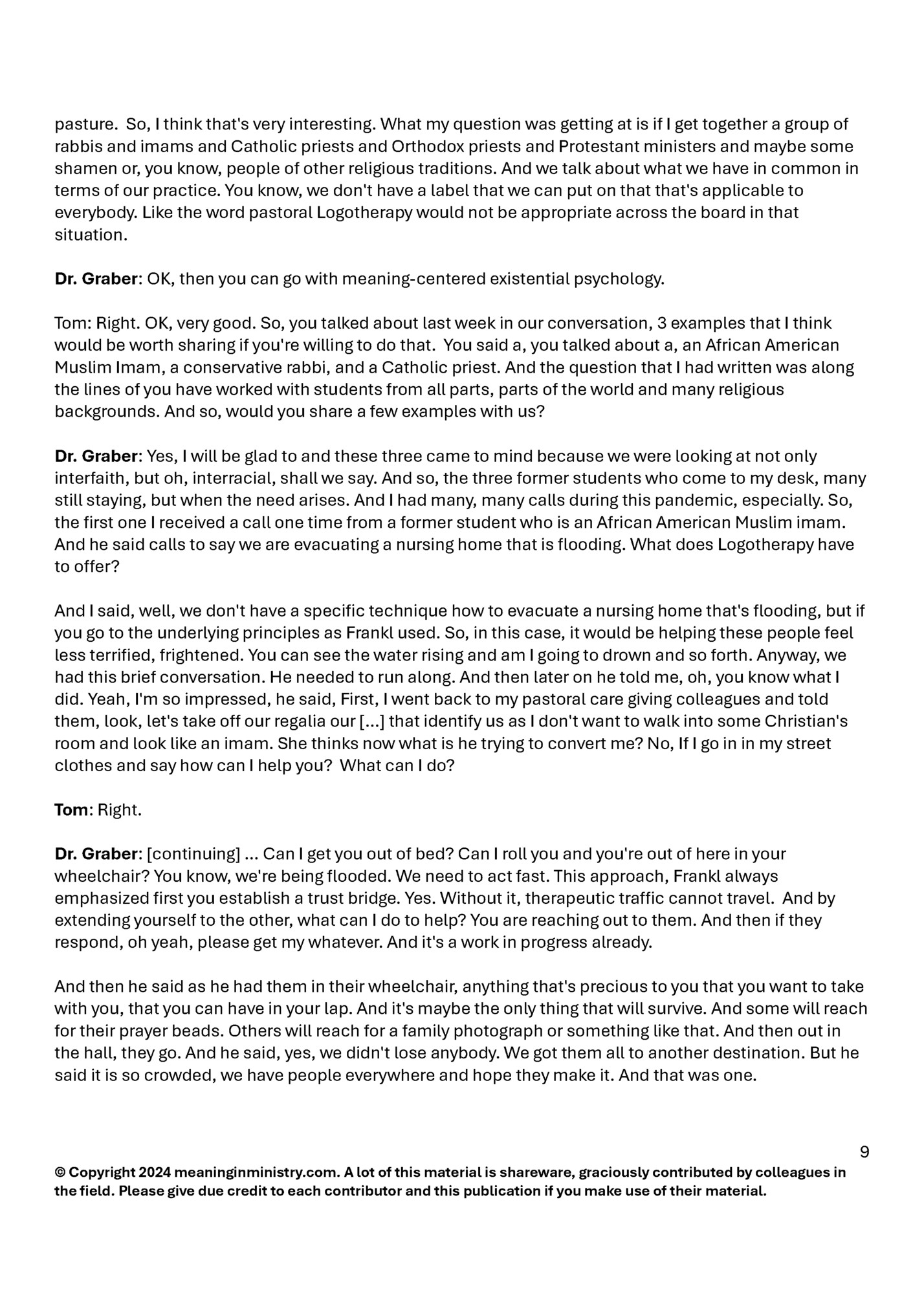
Fleepit Digital © 2021